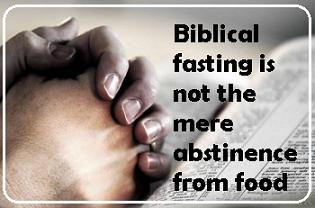Fasting
Fasting
The Presbytery recommended that ministers, elders and all Christians practice fasting. Although in the New Testament fasting is not commanded it is commended. The reasons given for fasting on this occasion were to humble ourselves, confess our sin, ask for God’s blessing and guidance, to glorify God and to pray God would enable us to make a greater impact on our communities.

Members of Presbytery were encouraged to give some time to fasting before the next regular meeting of Presbytery. Since fasting is not commanded in the New Testament it is the choice of each individual to decide whether or not they fast.
Fasting⤒🔗
In view of the above recommendation of the Presbytery I thought it might be helpful to write about fasting. When the word fasting is mentioned you might well be saying, “It’s certainly not for me.” Can we so easily dispense with what has been practiced in both the Old and New Testament. It is quite probable that many if not most of us have dieted or missed a meal or meals on various occasions so fasting or partial fasting is not really an alien concept. Perhaps the question each individual needs to ask is, does God want me to fast for my own or other peoples’ spiritual benefit?
Let us think about some of the examples of fasting in the bible. Hopefully we will find it fascinating, humbling and inspiring.
A Wicked Fast←⤒🔗
When King Ahab set his heart on Naboth’s vineyard, Naboth would not part with the inheritance of his fathers, so Queen Jezebel told the elder’s of Jezreel, “Proclaim a day of fasting and seat Naboth in a prominent place among the people. But seat two scoundrel’s opposite him and have them testify that he has cursed both God and the king. Then take him out and stone him to death.” (1 Kings 21:9, 10). Sadly all this was done and it certainly illustrates that fasting can go hand in hand with the grossest wickedness.
An “Orthodox” Fast←⤒🔗
In Isaiah 58 which is addressed to “my people” we see how people can profess the orthodox religion, observe (what was then) the Lord’s appointed time of fasting, be the picture of godliness and yet oppress the poor, turn a blind eye to injustice and do absolutely nothing to lighten the yoke of their own flesh and blood. Their “orthodoxy” was only in the religious ritual, it did not come from their heart and it did not positively affect their behaviour towards their fellowmen.
A Wise Fast←⤒🔗
In Isaiah 58 the same people are told,
Is not this the kind of fast I have chosen: to loose the chains of injustice and untie the cords of the yoke, to set the oppressed free and break every yoke? Is it not to share your food with the hungry and to provide the poor wanderer with shelter – when you see the naked, to cloth him, and not to turn away from your own flesh and blood?
This is wise fasting, when along with our fasting we are living in obedience and are showing genuine, practical, sacrificial love to those in need.
A Fruitful Fast←⤒🔗
In Isaiah 58 they are told if they fast in God’s way,
Then your light will rise in the darkness, and your night will become like the noonday. The Lord will guide you always; He will satisfy your needs in a sun-scorched land and will strengthen your frame. You will be like a well watered garden, like a spring whose waters never fail. Your people will build up the ancient ruins and will raise up the age old foundations; you will be called repairer of Broken Walls, Restorer of Streets with Dwellings.

Reflect for a moment on this – if all (in a community, in a nation in the world) of us who say we are Christians fasted in God’s way, by God’s grace we could expect to turn the world upsides down!
A Foolish Fast←⤒🔗
In 1 Sam. 4:24 we read.
Now the men of Israel were in distress that day, because Saul had bound the people under oath, saying, ‘Cursed be any man who eats food before evening comes, before I have avenged myself on my enemies!’ So none of the troops tasted food. As one commentator says, Time saved was strength lost.
Saul’s son Jonathan was unaware of his father’s command and ate some honey. Saul would have killed his own son had not the men intervened.
A Perfect Fast←⤒🔗
Our Lord Jesus Christ fasted for forty days (See Mat. 4:2) and like everything He did it could only be perfect. The fact that he did fast should make everyone think seriously, prayerfully and respectfully about fasting.
An Expectant Fast←⤒🔗
The prophet Joel saddened and perplexed by the ungodliness and the peoples’ abandoning of God’s ways, proclaimed:
Even now, declares the Lord, return to me with all your heart, with fasting and weeping and mourning. Rend your heart and not your garments return to the Lord your God, for He is gracious and compassionate, slow to anger and abounding in love, and he relents from sending calamity.
Little doubt but this could be said to us as a nation considering how we are turning our back on God. What a powerful encouragement to turn to the Lord with hope and expectation. We can say to ourselves and to all categories of sinners, “God remains, ‘gracious and compassionate, slow to anger and abounding in love, and he relents from sending calamity.’ Turn to Him with all your heart.”
A Showpiece Fast←⤒🔗
The Pharisees in Mat. 6 fasted to be seen of men, and they did it with style. They got their pathetic reward – they were seen. They should have done it in secret, from the heart and to God. They would have had an eternal reward. If we fast out of pride or merely abstain from food without engaging in heartfelt prayer, or think our fast merits God’s favour, it would be spiritually worthless.
An Expected Fast←⤒🔗
In Mat 6 Jesus says, “When you pray when you give to the needy.” The reader understands that Christ expected his people to pray and give to the needy. Jesus also says, “When you fast.” So it seems impossible to avoid the conclusion that he expected his people to fast.
A Profitable Fast←⤒🔗
In Mat 6 Jesus says with regard to proper fasting, “Your father, who sees what is done in secret will reward you.” Could anything be more encouraging?
A City Wide fast←⤒🔗
After hearing Jonah’s terrifying message, the King and people of Nineveh fasted, “And God had compassion and did not bring upon them the destruction he had threatened.” (Jonah 3:10)
An Apostolic Fast←⤒🔗
In Acts chap 13 and chap 14, we see fasting before Saul and Barnabas were sent on a missionary journey and when elders were appointed.

Biblical fasting is not the mere abstinence from food. It must be done from the heart to God, it must be accompanied by prayer, the less other people know about it the better although a number of people might agree among themselves to fast. We shouldn’t impose it on others but we could gently encourage others to do it. It must be accompanied by an earnest obedience.
It must be done in a spirit of humility so don’t be surprised if Satan does his utmost to stir up a spirit of pride in you the very time you try to fast. You could well feel lead to do it not only on account of your own sin, but also on account of the sins and needs of others in the church at large or in the world.
I like the advice given by Peter White, in “The Effective Pastor” (CFP):
Start small, perhaps missing one meal a week, or a month. In the time which you would have spent at the meal, speak in detail with God about something which in your heart of hearts is more important to you than eating. Whether you and God will want to develop such times will become apparent. In the meantime you have definitely asked God for something that really matters, and probably started to grow a very healthy independence of mealtimes.
Probably more than one reader will wish they had read Peter White’s advice before they had their first attempt at fasting, because they bit of more than they could chew!

Add new comment